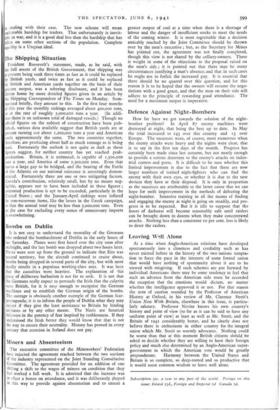Leaving Well Alone
At a time when Anglo-American relations have developed spontaneously into a closeness and cordiality such as has never existed before in the history of the two nations tempta- tion to force the pace in the interests of some formal union that would have nothing of spontaneity about it are to be viewed with misgiving. If such schemes are put forward by individual Americans there may be some tendency to feel that such an advance from the American side must be accorded the reception that the emotions would dictate, no matter whether the intelligence approved it or not. For that reason the note of caution sounded by the Professor of American History at Oxford, in his review of Mr. Clarence Streit's Union Now With Britain, elsewhere in this issue, is particu- larly salutary. Professor Nevins knows his own country's history and point of view (so far as it can be said to have any uniform point of view) at least as well as Mr. Streit, and the Britain of 1941 considerably better, and he clearly does not believe there is enthusiasm in either country for the integral union which Mr. Streit so warmly advocates. Nothing could be worse than that at this moment British citizens should be asked to decide whether they are willing to have their foreign policy and much else determined by an Anglo-American super- government in which the American vote would be greatly preponderant. Harmony between the United States and Britain is so complete, so deep-rooted and so productive that it would seem common wisdom to leave well alone.


























 Previous page
Previous page